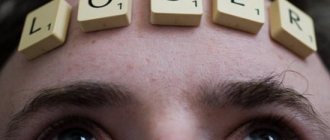Symptoms and causes of social phobia
If you are faced with the question of how to treat social phobia or periodically encounter panic, then after reading this article you will find all the answers to these questions and get closer to the solution.
Unlike many other phobias, such as arachnophobia - fear of spiders or claustrophobia - fear of closed spaces, where the problem is clearly expressed and understandable to both the patient and the doctor, social phobia is a complex, multifaceted problem and consists of many individual elements.
Panic fear of expressing one's opinion, fear of public speaking, fear of communicating with other people and other problems of social interactions are called social phobia. But is this really so?
Phobias of a social nature or social phobias: Anthropophobia is a panicky fear of people, a desire to avoid human society in any way.
Agoraphobia is a panicky fear of open doors and open space, as well as a panicky fear of crowds of people.
Social phobia is the fear of negative evaluation.
To understand how to get rid of social phobia, you need to understand that not every fear is a phobia.
A phobia (panic attack) is considered only fear that leads to a panicky, uncontrollable reaction of a person, when a person literally ceases to control his body, as opposed to a state of anxiety or local fear.
Tablets, drugs for social phobia
Social phobia is the fear of performing any actions when receiving attention from the outside. If a person suffers from this disease, then he needs to address it. There are several options by which this can be achieved.
Selective serotonin reuptake inhibitors
Drugs of this type are widely used in the treatment of social phobia. They are used to relieve anxiety and depression. The advantage of these drugs is that they have fewer side effects than antidepressants belonging to other groups. An example of such a drug is Cipralex.
In pharmacology, Cipralex is defined as an antidepressant that enhances the effect of serotonin. Take with plenty of water. During treatment, it is recommended to stop driving, despite the fact that the drug does not affect psychomotor activity.
The result can be observed after a few weeks, so you should not expect it to appear immediately.
Of the serious side effects, one can highlight one - decreased sexual activity , but there is no need to be too afraid in this regard, because
as the body adapts to the medicine, all unfavorable moments go away on their own; in the worst case, you should consult a doctor to properly reduce the dosage or remove the drug from the list of medications taken.
Behavioral therapy
Psychotherapists often use behavioral therapy to treat social phobia, which can also be called social medicine. At first, the patient shares his symptoms and presumably expresses an opinion about what is causing them.
In accordance with the manifestations of the disease, the doctor selects methods and techniques for solving the problem that will work effectively. After some time, the patient begins to receive “homework assignments,” which become more complicated each time. As a result, such therapy leads to healing from fear.
Homeopathy
Homeopathy is an outdated principle of healing, the essence of which is that the cause of the disease is used as a method of treating it.
On the one hand, this is a very dubious method of treating any problems, which is carried out by diluting low-concentrated drugs. There seems to be no harm, but no benefit either.
On the other hand, when a person believes in a so-called cure and takes homeopathic medicines, the placebo effect is triggered, which leads to a certain result.
And this point of view is also correct: as many people, so many opinions. It is impossible to say whether a method is good or bad.
At least, medicine does not know of such a case when a person received an overdose from homeopathic medicines.
Disputes about the scientific nature of homeopathy continue to this day. However, this industry trains qualified specialists.
Social phobia is a common illness that affects a large part of the population, but it is still possible to cope with it.
With the help of medications you can get rid of this disease for a certain period of time, but the treatment itself takes a lot of time, so it is important to be patient in this matter. Tablets are not sold freely, so treatment is impossible without consultation and a prescription from a specialist.
This precaution is due to the fact that these drugs are similar to drugs, and if the dosage is incorrect, they can lead to not the best consequences.
There are three main types of drugs in the treatment of social phobia with pills: SSRIs, benzodiazepines, beta blockers. They have some similarities and differences: they help with a common problem and relieve the symptoms of social anxiety, but the reasons for taking them, dosage, duration of action and side effects differ greatly in characteristics.
Clinical picture
Social phobia is a pathological fear of social contacts and activities accompanied by the attention of strangers. This is a serious neurotic disorder that is chronic in nature and usually occurs without remission.
Social phobia, as a rule, begins to develop in childhood and adolescence. Up to 90 percent of social phobias develop the disease before the age of 25. Such an early onset of social disorder and lack of treatment often causes disturbances in normal personality development.
Social phobes have difficulty obtaining an education and are unable to fully demonstrate their professional qualities, which contributes to the development of disability, a low level of material security and dependence on relatives.
Social phobia negatively affects the ability to form close relationships and leads to loneliness.
Causes of phobia
Various assumptions have been made about the factors causing the development of social phobia. One of the key factors is the presence of traumatic social experiences.
Social phobia occurs when experiencing or witnessing a perceived public failure or humiliation.
An impressive number of social phobics have personally experienced physical abuse and humiliation at school from peers or bullying at work.
One theory suggests that the child copies the social phobic behavior of the parents. On an intuitive level, he senses the anxiety of his mother or father, and absorbs negative attitudes towards the world.
It is also noted that many people suffering from social phobia were deprived of the necessary warmth and psychological support from significant adults in childhood. Indeed, in early childhood, it is the parents who are the child’s model of the entire outside world. It is obvious that disharmonious communications with loved ones are a traumatic experience for the psyche.
Another explanation for social phobia is a lack of social skills. If a person does not know and does not understand how to behave in a particular situation, this may cause him to fear making a mistake. Overprotective adults often limit a child's chances of gaining the necessary experience of social interaction.
Psychoanalysts explain the fear of being rejected or rudely ridiculed by the projection of one’s own aggressiveness onto others. Indeed, from the point of view of psychoanalysis, the function of anxiety is to protect against awareness of unacceptable instinctual impulses. Social phobia may hide narcissistic tendencies and selfish desires that a person expects to satisfy at the expense of others.
For example, a guy experiences symptoms of social anxiety when meeting girls. Hypertrophied pride may be behind the fear of rude refusal. Or, for example, a not fully realized consumer attitude towards girls and self-condemnation in this regard causes him to expect fair punishment.
How to cure social phobia with pills
Despite the fact that the onset of social phobia precedes the development of any comborid disease, drug therapy is more often prescribed specifically for the treatment of a secondary disease. If social phobia is accompanied by depression, reversible MAO inhibitors (Moclobemide, Tetrindole) are prescribed. For panic attacks, beta blockers (propranolol or atenolol) are prescribed.
It is important to understand that social phobia is a serious disorder that has a protracted, progressive nature and therefore requires a long course of treatment. Even after stopping the drugs after six months of therapy, the risk of relapse reaches 50%. And yet life without social phobia is possible. The chances of achieving sustained remission increase with a combination of drug and psychological therapy.
How to overcome social phobia with psychotherapy
The following are considered the most effective methods of working with social networks:
- modeling (observation of the experience of someone else and its imitation);
- cognitive hypnotherapy;
- systematic desensitization;
- psychodrama.
An important element of therapy are relaxation exercises (breathing exercises, neuromuscular relaxation). They help reduce physical stress and make it easier to work with other techniques.
Since one of the main goals of therapy is to manage anxiety during social interactions, group forms of treatment will be helpful. Typically, these types of therapy are conducted in the form of training to develop self-confidence and gain communication skills.
Combating social phobia with cognitive hypnotherapy
The use of hypnosis more than doubles the effectiveness of standard psychotherapy and significantly speeds up the recovery process.
The goal of cognitive psychotherapy is to replace negative mental attitudes in the client’s subconscious that produce social fears.
To find out more about how to get rid of social phobia using hypnosis, we recommend contacting psychologist-hypnologist Nikita Valerievich Baturin.
Social phobia: how to get rid of it yourself
Since the course of psychotherapy takes quite a long time, the treatment takes a significant toll on the pocket of a social phobia person, who, due to his illness, cannot always support himself financially. Advice from psychologists will come to your aid on how to overcome social phobia on your own.
Social phobia: how to get rid of it by correcting beliefs
The feeling of social anxiety is caused not by events themselves, but by their assessment. Thoughts arise first, and only then does an emotional reaction occur. It is important to learn to monitor the automatic negative thoughts that provoke social fear.
Social phobia symptoms
Signs of social phobia are quite easily identified in a person; for this you do not need to see a specialist. Imagine in your mind the most frightening social situation for you. If you feel dizzy, your legs literally go limp, your heart rate increases and you want to quickly escape this situation, then you are faced with social phobia, like thousands of other people.
But there is good news: there is absolutely no need to put up with this problem - modern methods of psychotherapy have long been able to treat social phobia.
If you have signs of social phobia, then you should seek help from a specialist psychologist-psychotherapist.
The cause of any phobia is psychological trauma (neurosis). Literally, a situation that is not accepted by the human psyche “gets stuck” in the head.
To summarize, social phobia, what is it?
Social phobia symptoms:
- Dizziness
- Negative sensations in the body
- Weakness in the legs
- Uncontrollable behavioral reactions
Depth of the problem:
- Local fear
- Alarm state
- Phobia
Social phobia causes:
- Psychological trauma
Treatment of social phobia
Treatment of social phobia is possible in several ways, and the simplest and at the same time the cheapest is to resort to drug treatment. Unfortunately, treating social phobia with this method has a number of disadvantages, and the main one is relapse of the problem, because It is the symptoms that are treated, not the cause of social phobia.
Treatment of social phobia without medication is possible using psychotherapeutic methods, such as hypnosis, Gestalt therapy, integral neuroprogramming, Bert Hellinger constellations and others.
The cost of seeing a psychotherapist in the city of St. Petersburg is currently available to anyone, in addition, the initial appointment is often free. I receive appointments in person in my office in St. Petersburg or remotely via Skype.
If it is not possible to seek qualified help, I suggest considering exercises to overcome social phobia.
Most DIY methods can be summarized in the following structure:
- Recognition of the presence of a phobia;
- Identification of situations where social phobia occurs;
- Visualization of problem situations;
- Gradual approach to the problem;
- Training in relaxation and relaxation techniques;
Medications for social phobia
The psychiatrist prescribes drugs in strict accordance with the diagnosis, but as a rule, the following drugs are prescribed:
- Antidepressants (selective serotonin-norepinephrine reuptake inhibitors) affect certain neurotransmitters that are responsible for mood.
- Benzodiazepines are fast-acting psychoactive drugs that can be used to temporarily block anxiety. They are effective in the short term but can be addictive.
- Beta inhibitors interfere with the production of adrenaline. Typically, these drugs are used to reduce symptoms of anxiety, particularly tremors and rapid heartbeat.
Antidepressants for social phobia are prescribed by prescription, but the most popular are Fluoxetine (Prozac), Mianserin (Lerivon) and others. Drugs for social anxiety are widely represented on the pharmaceutical market in St. Petersburg; the cost of the drugs will primarily differ depending on the country of origin.
make an appointment for +7
using the form below:
Review of tablets used to treat social phobia
Let me make a reservation right away that this article is for informational purposes only. There is no specific information here about which pills you should take and which you shouldn't. Perhaps it will appear in the future.
If you don’t want to miss it, you can subscribe to updates in any convenient way (by mail, by joining a VKontakte group, as well as by RSS or using).
Now let's move on to the article itself.
There are several different types of pills for social anxiety. The main ones include:
- benzodiazepines
- monoamine oxidase inhibitors (MAOIs)
- beta blockers
- selective serotonin reuptake inhibitors (SSRIs)
- selective serotonin and norepinephrine reuptake inhibitors (SSRIs)
Each type of social anxiety pill has its own advantages and disadvantages, depending on your specific situation.
Description
Benzodiazepines relieve symptoms of anxiety, which is achieved by influencing the central nervous system. Benzodiazepines can cause sedation and addiction, so they are preferred not to be used as a primary medication for the treatment of social phobia.
List of drugs
- Ativan (lorazepam)
- Valium (diazepam)
- Xanax (alprazolam)
- Klonopin (clonazepam)
Selective serotonin and norepinephrine reuptake inhibitors (SSRIs)
SSRIs are antidepressants used to treat anxiety.
Signs of social phobia
For example, a teacher at school made fun of her student and all the children in the class witnessed this.
What happens to the child? He is afraid to raise his hand and answer the subject; he does not want to go to school .
Over time, this passes, and the child forgets his unloved teacher, something new and interesting captures him, and he feels confident in life. This is a temporary sign of social phobia.
But it can be completely different if the child constantly encounters situations that begin to cause fear of communication and expressing himself; disorders will begin to accumulate and he will not be able to overcome his fear of society on his own, and social anxiety in this case will be a constant sign of social phobia.
The first signs of social phobia appear mainly at school age, when the child is exposed to childhood cruelty, the wrong attitude of adults and the unprofessionalism of teachers.
Who are social phobes?
People who suffer from social anxiety are called social phobics.
Basically, a social phobia is a person who is depressed or an addicted alcoholic.
Social phobes try not to talk, even on the phone; cannot work or eat when people are looking at them; don't look people in the eye. These actions are explained by the reaction of the social phobia's body, which causes side effects such as rapid heartbeat, heavy breathing, difficulty speaking, stuttering, nausea, dizziness, trembling, a sharp change in body temperature, and tears.
A sociophobe is terrified of meeting and communicating with new people, especially with representatives of the opposite sex, and the more important the acquaintance and his interlocutor are for him, the stronger the fear.
Finding himself in a situation in which it is necessary to make contact and express himself in front of others, the social phobe has a fear that he will be humiliated and will be ashamed of something.
Such a person believes that everyone thinks that he is a loser. These are the types of situations that a social phobe fears most.
It is not easy for such a person to speak, read a report or pass an exam, even if he is well prepared and has all the necessary knowledge.
Social phobes avoid situations in which they feel uncomfortable.
They try not to be in large companies, often refuse invitations to any event, and will not join the company when shopping or traveling out of town; are able to show obsessive thoughts about their behavior, negatively assessing it, and constantly analyze what they think are their wrong actions, exaggerating and distorting the facts.
Social phobia worries about everything related to social activities. Dozens of questions arise in his head, which only aggravate his mental state and further develop social phobia, while they all have the same meaning: “what will they think of me?” A social phobia person is especially overcome by fear when he realizes that people can see his unbalanced, nervous state.
And yet, a social phobe accepts his problem, considers himself an inadequate person and understands that he is completely unsuited to social actions, so he always looks for evidence and reasons for his inability to communicate with people.
Causes of social phobia
Researching the causes of social phobia, scientists used knowledge from neurobiology to sociology; took into account all the necessary theories and found that the occurrence of social anxiety is influenced by hereditary predisposition, social factors and environmental factors.
More precisely:
- Genetics and family factors.
- Influence of the past and lack of communication experience.
Researchers say that if immediate family members experience similar anxiety disorders, there is an increased risk of passing on the disorder. This may be due to genetic inheritance or due to children observing their parents' fears.
Studies conducted with twin children adopted by different families show that if one child develops social phobia, the other has an up to 50% higher risk of developing the disease .
At the same time, the researchers suggest that the parents of such children also suffer from social anxiety disorder, since similar shyness was present in both parents and children of both families.
The risk of developing social anxiety may also be due to children being severely criticized or overprotected in childhood.
There are studies of behavioral inhibition. What does the peculiarity of the nervous system and its functioning mean, in which a person is afraid of everything that surrounds him and is strongly concentrated only on himself. Studies were conducted with newborns, it turned out that up to 15% of newborns have this feature, which is one of the causes of social phobia in people's lives.
Studies have proven that people who have no experience of socialization are prone to social phobia; mainly those with increased sensitivity . Lack of experience may be due to psychological trauma, which was caused by humiliation in front of strangers or some other traumatic social event.
Social disorder can be caused due to rejection, rejection by peers, long-term bullying, and “not fitting in” into the team.
During their school years, people suffering from social phobia faced situations in which their peers subjected them to physical and psychological violence, which the respondents admitted to the researchers.
The study showed that children with the least popularity, who do not receive positive feedback from their peers, who are afraid of being humiliated, avoid any communication and become social phobics.
Symptoms of social phobia
Cognitive.
Cognitive symptoms appear in social phobics who are self-centered and care about the opinions of others. Such people do everything possible to make a good impression, although they think that this will not be possible, and then analyze, worry about their wrong behavior and carry anxiety within themselves for a long time.
Physiological.
These include manifestations of physiological effects that are similar to other anxiety disorders: redness of the facial skin, tears, tremors in the limbs, etc.
Behavioral.
These symptoms appear in people who have been suffering from social phobia for a long time and belong to those whose behavior is avoidant, which significantly influences the further development of the disease.
Relationship to other anxiety disorders.
Social phobia can be closely related to mental disorders such as depression, suicide, stress disorder after mental trauma, alcoholism, etc. For example, in the desire to get rid of social anxiety, a person uses alcohol or drugs, which leads him to addiction. Thus, there is a connection with other disorders.
Types of tablets
Medication treatment for social phobia is a common type of help for people who experience discomfort due to their problem. After taking medications, a person can reduce the symptoms that are inherent in this disease.
It is worth getting additional advice from a qualified specialist about tablets for social anxiety to avoid worsening the condition.
It will not be possible to completely get rid of the problem with the help of drugs, as evidenced by the observations of practicing doctors.
The basis of medications for social phobia are:
- benzodiazepines;
- selective serotonin reuptake inhibitors;
- beta blockers.
How to deal with social phobia yourself: basic recommendations
Social phobia drives a person into the “dark corners” of his soul, causing severe depressive episodes. And at such moments, “breakdowns” are quite likely, when independent treatment, which no one controls, is simply abandoned. Therefore, even before starting such therapy, some key rules should be fixed:
- Don't give up, even if the situation seems hopeless. In a month it will be better than today.
- Maintain regularity, not allowing yourself to be lazy and go with the flow. Missing one day sets a person back a week.
- Do not talk about the work being done to those who cannot provide adequate support. It is better to go alone than in the wrong company.
- Praise yourself even for small victories. The real significance of an achievement does not matter if it was inaccessible just yesterday.
- Don't compare yourself to others. Other people actually have a lot of their own problems that they also struggle with.
- Allow yourself to make mistakes. A mistake does not make a person worse, unless he gives up after it.
You can come up with some other rules, then print them out and always keep them in a visible place. In difficult times, you need to look at this list.
How to deal with social phobia through self-hypnosis
The problem of social phobia is low self-esteem. A person considers himself not good enough, and therefore believes that he:
- Uninteresting, ugly, stupid, ridiculous.
- Can't please anyone.
- Capable of causing only ridicule and condemnation.










